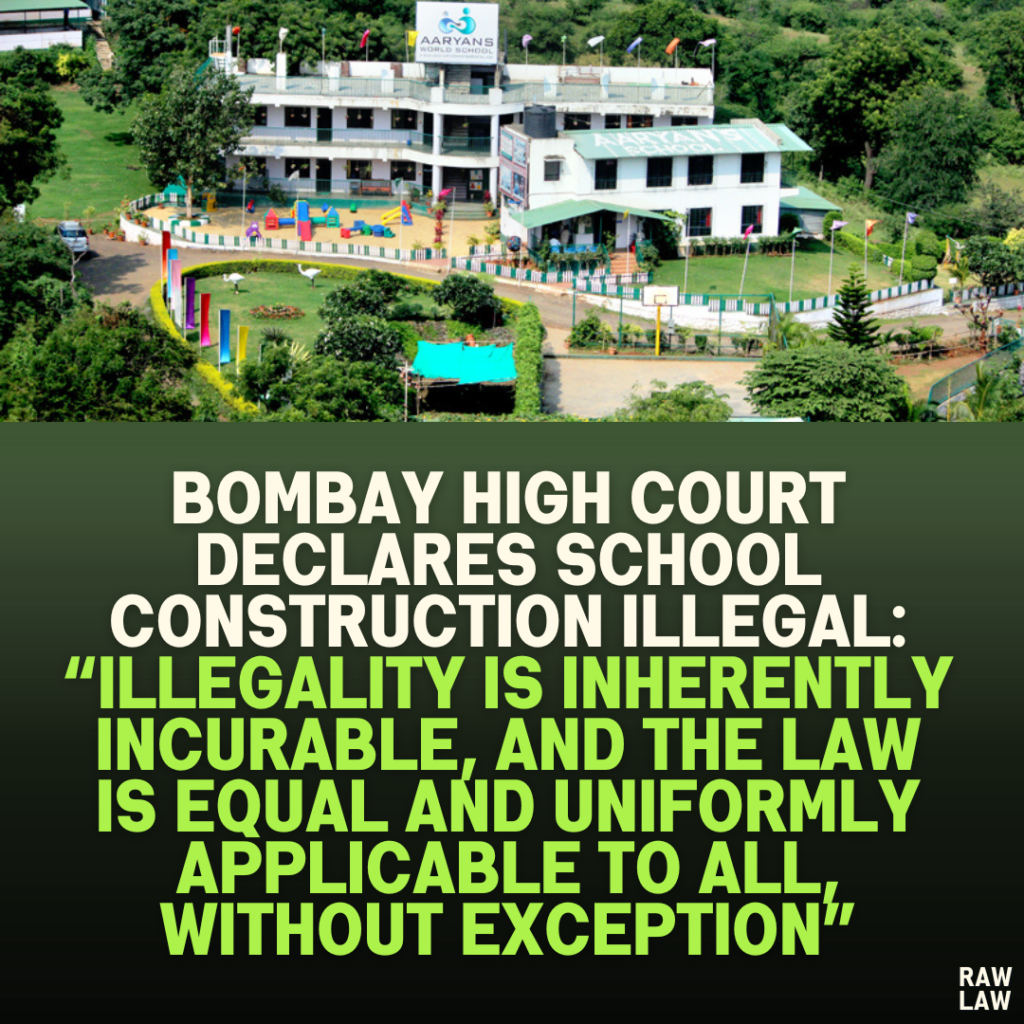Court’s Decision
The Bombay High Court dismissed a writ petition filed by a charitable educational institution challenging the demolition order issued by the Pune Metropolitan Region Development Authority (PMRDA). The Court held that the construction was wholly illegal, having been undertaken without requisite permissions from the competent authority. It rejected the plea to regularize the structure, observing:
“Illegality is inherently incurable, and the law is equal and uniformly applicable to all, without exception.”
The Court also directed the State of Maharashtra to initiate action against the Grampanchayat and its Sarpanch for unlawfully issuing the No Objection Certificate (NOC) and to file a compliance affidavit by 14 November 2025.
Facts
The petitioner is a well-established non-profit educational institution serving approximately 2,000 students from Standard 1 to 10. It had constructed a school building at Bhilarewadi, Pune, based on an NOC dated 1 October 2007 issued by the Grampanchayat. Following the formation of PMRDA in 2016, the Tahsildar and Designated Officer of PMRDA issued a demolition order on 17 April 2025 against the unauthorized structure.
Despite having filed an application for regularization on 17 January 2025, the same was rejected by PMRDA on 23 January 2025. The demolition notice required the school to remove the construction within 15 days.
Issues
- Whether the Grampanchayat was a competent authority to grant permission for construction at the time.
- Whether the construction could be regularized post-facto under the Maharashtra Regional Town Planning Act (MRTP Act), 1966.
- Whether the fact that the structure is an educational institution should merit equitable consideration for regularization.
Petitioner’s Arguments
The petitioner contended:
- That the construction was carried out based on the NOC issued by the Grampanchayat, which was the relevant authority before PMRDA’s creation.
- That they immediately applied for regularization upon receiving the notice.
- That being an institution serving a large number of students, leniency should be shown and the matter should be relegated back to PMRDA for reconsideration.
Respondent’s Arguments
The counsel for PMRDA argued:
- That the construction was entirely unauthorized and the petitioner had not provided any sanctioned building plan from a competent authority.
- That the Grampanchayat had no power to grant construction permission.
- That the petition should be dismissed outright due to the patently illegal nature of the construction.
Analysis of the Law
The Court reiterated the principle that construction without proper authorization is inherently illegal and cannot be cured retrospectively. It emphasized that Section 53(3) of the MRTP Act does not provide for ex post facto regularization of illegal constructions, only for retention of structures that had some semblance of legality.
The Court noted:
“This is yet another case where illegal construction has been erected based on the ‘No Objection Certificate’ granted by the Gram Panchayat… Courts have held that the Gram Panchayat has no authority to grant permission for construction.”
Precedent Analysis
The Court cited multiple decisions including:
- Manoj Ramanand Prajapati v. State of Maharashtra — 2017 SCC OnLine Bom 8743.
- Sunil Vishwanath Madavi v. Chief Secretary, State of Maharashtra — Writ Petition No. 833/2019 (25 July 2024).
- Indradas Kacharu Gaikar v. Kalyan Dombivali Municipal Corporation — 2025 SCC OnLine Bom 219.
- High Court on its Own Motion v. State of Maharashtra — 2024 SCC OnLine Bom 918.
- Rajendra Kumar Barjatya v. U.P. Avas Evam Vikas Parishad — 2024 SCC OnLine SC 3767.
- Kaniz v. Sabuddin — 2025 INSC 610.
These rulings consistently held that courts must not regularize illegal constructions, particularly when there is no sanction from competent authorities.
Court’s Reasoning
The Court decisively held that the construction was unauthorized as:
- No permission had been obtained from the competent authority.
- The Grampanchayat’s NOC was irrelevant and ultra vires.
- PMRDA, being the competent authority post-2016, had rightly rejected the regularization application.
It stated:
“Such misplaced sympathy not only undermines the sanctity of the law but also jeopardizes the very foundation of town planning.”
The Court emphasized the increasing tendency of violators to create third-party rights or invoke emotional appeals after committing illegal acts.
Conclusion
The writ petition was dismissed. The Court upheld the demolition order and refused to relegate the matter to PMRDA for reconsideration. It directed:
- The State must take action against the Grampanchayat and its Sarpanch for issuing an unlawful NOC.
- A compliance affidavit must be filed by 14 November 2025 indicating steps taken.
Implications
This judgment serves as a strong warning against unauthorized constructions in Maharashtra and reinforces the position that:
- NOCs from non-competent authorities like Grampanchayats carry no legal sanctity.
- Educational or charitable purposes do not immunize illegal constructions from demolition.
- Courts will not show misplaced sympathy or permit judicial regularization of blatantly illegal structures.
- Authorities and violators alike may face legal consequences, including penal actions against public officials involved in enabling such constructions.
This ruling strengthens urban planning enforcement and discourages post-facto pleas for regularization that undermine statutory regimes.




Pingback: Bombay High Court Refuses to Reject MLC Election Petition Alleging 587 Ineligible Voters — “No Absolute Legal Bar Against Raising Electoral Roll Issues in an Election Petition, Especially When Irregularities Could Vitiate the Result” - Raw Law